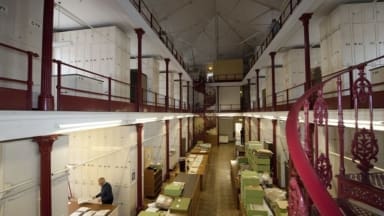
The plans for the herbarium to relocate to the plant library in the Thames Valley Science Park has botanists worried about the future of their vital work. Opponents of the move, which includes many Kew staff, say it is unnecessary and will only hamper their research.
An impact survey for staff of RBG, Kew was conducted from April-Sept 2024 by Prospect – the Union for Science and associated professional staff. The survey was open to both members and non-union members to ensure the survey was more representative of science staff (not all staff are Prospect members). The survey consisted of 10 questions with multiple-choice answers with and space for respondent comments. A total of 228 respondents participated; 207 Science, 19 Horticulture (1 each in MCE and Resources) – based in the Herbarium (136), Jodrell (51), Wakehurst (18) or other (23).
Preliminary data from the survey results revealed:
- 82% of staff believe the move to negatively impact Kew’s ability to attract and support visiting researchers
- 82% of respondents considered it would be negative for Kew’s commitment to training the next generation of plant and fungal scientists (e.g. Kew MSc students, Kew Hort. Dip., PhD students). These percentages remain over 80% among respondents based in the Jodrell.
- 70% of respondents considered the move would negatively impact Kew’s mission to “understand and protect plants and fungi, for the wellbeing of people and the future of all life on earth.” 8% considered it positive.
- 65% of staff expect the move to negatively impact their work and another 21% are unsure but concerned about the impact it may have, while only 2% expect a positive impact.
- 27% of respondents said they would most likely leave Kew if their role moves permanently to the new site at Thames Valley Science Park (TVSP) and a further 25% said that they will not be able to relocate. Meanwhile 21% don’t know if they can relocate, 18% are not concerned, and 7% can relocate.
- 73% said this project is negatively affecting their well being. 62% said negatively and 12% said they didn’t know and that this is affecting their well-being negatively, while 13% didn’t know and said it was not affecting their well-being.
- Numbers of respondents who feel positive about various aspects of the move were consistently below 10%, even when looking at replies for each site (Herbarium, Jodrell, Wakehurst) separately. When considering all staff together, those who feel positive represented less than 5% in almost all cases, except that 6% of staff said that moving the herbarium (and associated library collections) would be positive for their well-being.
According to Kew’s management, the complex housing of the collection at Kew was ambitious for its time. The current site now holds a world-class collection of millions of specimens that is constantly increasing and in their view it is unlikely that long-term expansion on the current site will be possible. “Our desire is to create a bespoke space dedicated to safely preserving and using the collection as an instrument of science for good for the next century,” explains the management.
The Kew Keepers on the other hand, explain that the move would be disastrous as the work of Kew’s world-leading experts on plant diversity would be isolated – away from the living plant collections at Kew, and away from colleagues in other branches of Kew science, inhibiting vital collaboration and research within Kew. As a result, they also believe it to be a waste of valuable resources. “The Director’s brainchild, the New Herbarium Project, aims to move the world-famous Herbarium at Kew to a business park near Reading. Kew Herbarium staff maintain that this move is unnecessary and a massive waste of public funds. While the exact costs are still to be determined, Kew management has suggested a sum of £200 million for the new Herbarium building at Reading; for the subsequent Science Quarter project on the Kew site, as much as £300 million may be required. So far, DEFRA have poured about £7 million down what may well become at least a half a billion pound project drain,” explain the Kew Keepers.
The survey has confirmed the views of Kew staff, but it remains to be seen how they may be taken into consideration.

